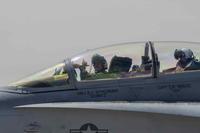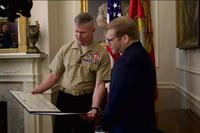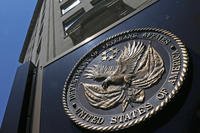It doesn't fly high-profile missions to launch airstrikes or gather intelligence, but for the last 60 years the KC-135 Stratotanker has refueled aircraft on key operations around the world.
The first KC-135 took flight on Aug. 31, 1956, and to celebrate the milestone, the Air Force this week released videos looking back on six decades of service for the first jet-powered refueling tanker.
"Today we honor the legacy of the KC-135 Stratotanker since its first flight 60 years ago," Gen. Carlton Everhart, head of Air Mobility Command, said in an email. "This aircraft is the foundation upon which Air Mobility stands. Air Force Global Power does not exist without global reach and the KC-135 has provided this capability to our nation since 1956."
%embed1%
Even as the service works to develop a replacement tanker, the KC-46 Pegasus, also made by Chicago-based aerospace giant Boeing, the anniversary "serves as opportunity to look toward the future to ensure global reach for generations to come," Everhart added.
Crews from McConnell Air Force Base, Kansas, on Tuesday took Air Force leaders, other officials and reporters aboard the tanker to refuel a B-52 Stratofortress bomber over Colorado and eight F-16 Fighting Falcon fighters over Texas, according to KWCH-12 News.
%embed2%
Stateside, KC-135s reside at McConnell and Tinker Air Force Base, Oklahoma, among other locations with Guard and Reserve units.
Overseas, some Stratotankers are stationed at Incirlik Air Base, Turkey, to support aircraft operating in multiple theaters. For example, in the fight against militants affiliated with the Islamic State in Iraq and Syria, or ISIS, KC-135s contributed to 46,535 sorties flown by air refueling tankers this year alone.
"The contributions it makes to today's fight enable our ability to apply persistent pressure against Da'esh and ensure security across the area of responsibility," Lt. Gen. Jeffrey L. Harrigian, commander of Air Forces Central Command, said in a statement, using another name for ISIS.









